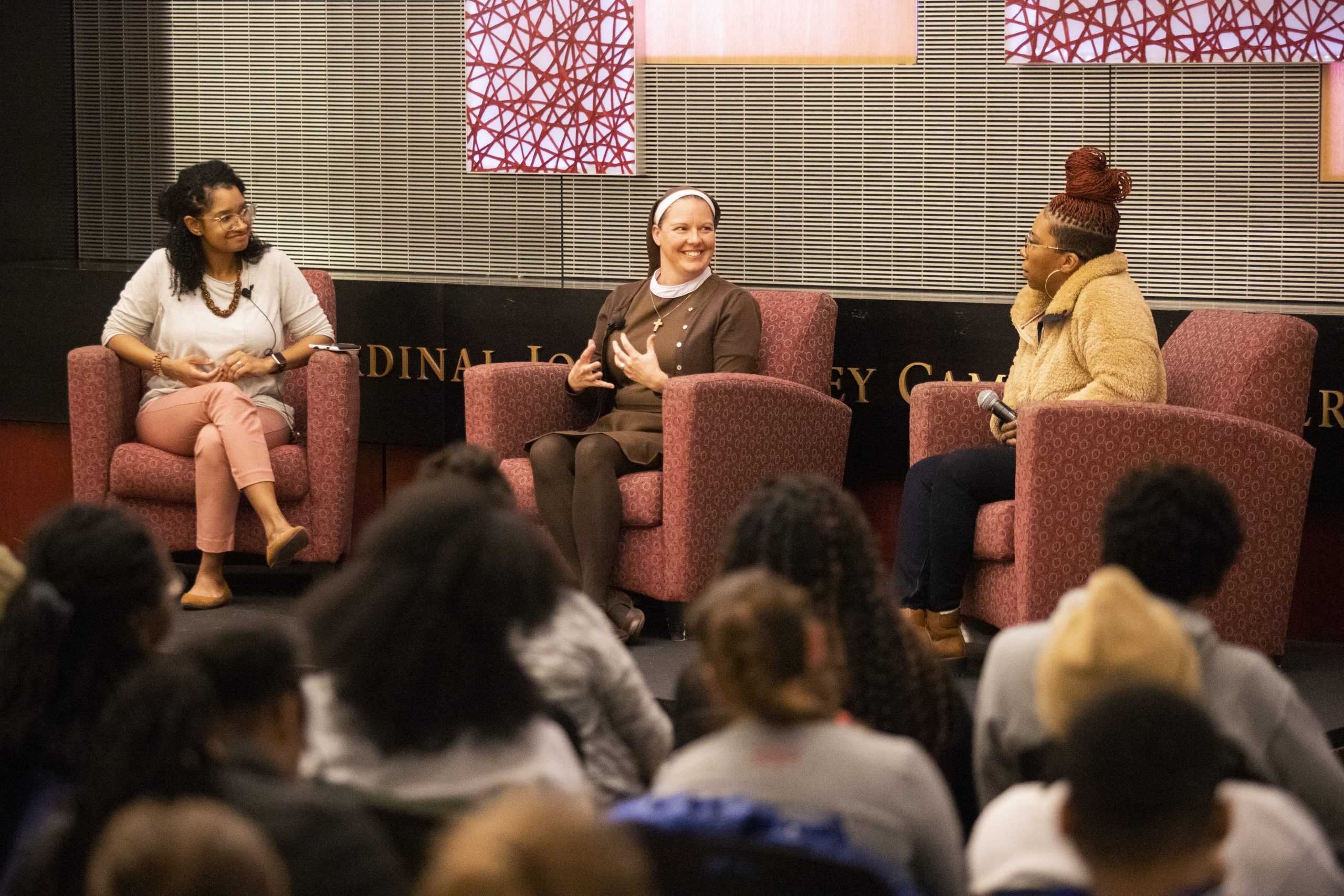A panel discussion sponsored by the Faith-Justice Institute on Feb. 5 focused on the need for the Catholic Church to better respond to the disproportionate impact of the criminal justice system on communities of color.
The event, titled “A Conversation: the criminal justice system, communities of color, and the Catholic Church,” was moderated by Dawn Araujo-Hawkins, news editor for The Christian Century, a Christian magazine based in Chicago. Two other panelists included Sister Alison McCrary, SFCC, who is also an attorney who works with inmates on death row, and Lezley McSpadden, the mother of 18-year-old Michael Brown who was shot and killed by Darren Wilson, a white police officer in Ferguson, Missouri, on Aug. 9, 2014.
Araujo-Hawkins, who facilitated the discussion, told The Hawk that while the Catholic Church does a “good job” addressing social justice issues like immigration, the Catholic Church has ignored “anti-black racism.”
“I think within each religion they have their own racial history that affects how they deal with racial issues in a contemporary way,” Araujo-Hawkins said. “The Catholic Church has long had a struggle with race in particular.”
McCrary, who works as a national criminal justice reform strategist for a national network of 50 non-profits that are started and run by formerly incarcerated people,
said individual Catholics are doing great work, but the Catholic Church does not speak out enough on racial justice issues.
“We need to invest in dismantling racism and white supremacy in all of its forms,” McCrary told The Hawk. “It starts with an acknowledgement of the harm that the Catholic Church has done.”
According to McCrary, the criminal justice system was created out of slavery, and even the first police officers were hired to catch runaway slaves.
“Whenever institutions or systems are created and the foundation on which they are created is an unjust foundation based on wrongs of humanity, we have to create a whole new system,” McCrary said.
Melissa Logue, Ph.D., assistant professor of sociology, who hosted McCrary and McSpadden in one of her classes earlier in the day, said a lot of times people look at the justice system and only see that it’s horrible and unjust.
“There are good people in the justice system, there are bad people in the justice system,” Logue said, “but I think the bigger problem is the policies and how they may get executed.”
McCrary said people should think creatively and look at other systems that are not based on a “vestige of slavery.”
“Our prisons are punitive,” McCrary told the audience during the evening discussion. “They’re not rehabilitative for anyone. They tear families apart, [and] they tear communities apart.”
Elizabeth Linehan, Ph.D., professor emerita of philosophy, said it has taken the Catholic Church a long time to really see the racial injustice in the system. Linehan taught in the university’s Inside-Out Prison Exchange Program and does work that focuses on restorative justice.
“There is massive racial discrimination in the way that the criminal justice system operates,” Linehan said. “The system doesn’t do what it’s supposed to do. It doesn’t reform people.”
McSpadden ran for public office in Ferguson in 2019, but did not win. She now
manages several organizations in memory of her son—Camp Brown Kids, The Michael O.D. Brown We Love Our Sons & Daughters Foundation and the Rainbow Of Mothers program.
“I want to keep Michael’s legacy alive,” McSpadden said.

During the discussion, Araujo-Hawkins asked McSpadden what she thinks is the first step in breaking down discriminatory practices within the system, particularly as they relate to police encounters and communities of color.
“I feel like the hearts and minds of folks need to change first,” McSpadden answered. “Policy should come second.”
Maria McBride ’20, an elementary education and special education double major who attended the discussion, said the panelists made her feel uncomfortable and guilty that she is part of a culture and society that makes racial injustice acceptable.
“I don’t think it’s a responsibility of one population of [people],” McBride said. “I think it’s the responsibility of all people to take it on together.”
Araujo-Hawkins said while she thinks this conversation is heavy, she hopes that people can seek solutions and be a part of a solution.
“A lot of people, even well-intended people, can distance themselves from real pain and real struggle and real issues,” Araujo-Hawkins said. “I hope that people will come away with empathy and compassion and understanding and also some hope and optimism because these can be dark and heavy issues.”
Dessi Miles ’21, a psychology graduate student, said it was important to her to attend the conversation as a young woman of color at a predominantly white institution.
“I want to set an example for my friends and my classmates, but also I feel like I needed to be more aware of my surroundings and who I am and my identity,” Miles said.













































